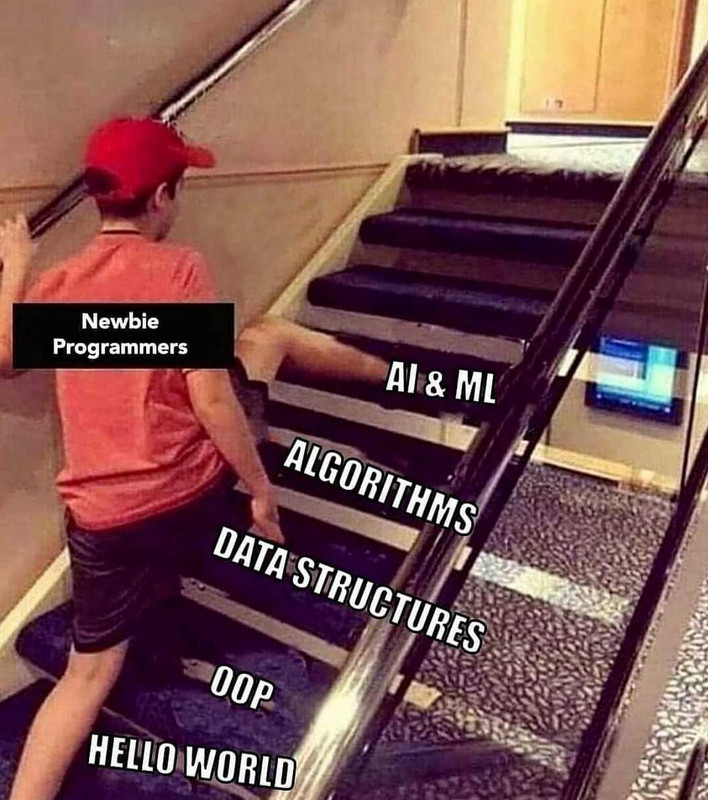this post was submitted on 13 Jul 2023
1047 points (98.3% liked)
Programmer Humor
36621 readers
219 users here now
Post funny things about programming here! (Or just rant about your favourite programming language.)
Rules:
- Posts must be relevant to programming, programmers, or computer science.
- No NSFW content.
- Jokes must be in good taste. No hate speech, bigotry, etc.
founded 5 years ago
MODERATORS
you are viewing a single comment's thread
view the rest of the comments
view the rest of the comments

While applying it where most shitcoins have applied Blockchain, I agree it's all hype. But Blockchain doesn't solve a non-existent problem.
Trusting humans is an inherent security flaw. Blockchain solves that problem. You don't have to trust banks to not shortsell the housing market with your own money (causing a recession for the entire world) if you could cut humans out of the equation.
Forget money. Say the data that you want to be able to transact and operate on is health data instead of financial information. You could create a decentralized identity system based on people's biometric information. From there, you could automate and decentralize governance in general.
Suggesting Blockchain solves a non-existent problem is like suggesting Lemmy solves a non-existent problem
Unrelated to the overall point you're trying to make, but shorts didn't cause the '08 recession. They just profited from it. The cause was banks treating mortgage backed securities as if they were an unsinkable asset class.
Relating things back to your point though, I'm not convinced that blockchains solve this. Take the crypto crash of spring/summer '22: You have a few products (TerraUSD/Luna, CEL token) "generating" yield that everyone (DEFI, CEFI, retail, institutions) piles on top of. Then that base layer of "value" turns out to be a naked emperor and there's a massive crash when everything based on that system is now backed by nothing. Rigid computerized rules are only as solid as the axioms that underpin them. You can decentralize the interpretation of rules, but somebody can always start with a flawed assumption and then it doesn't matter how reliable your decentralized system is.
As long as any asset can be rehypothecated into another, shinier asset, there's always a risk that the underlying asset is shit. It's no less true in crypto as in conventional banking.
He did not claim that shorting caused the 08 crash, or am i missing something?
According to "the big short", the reason was that banks gave loans to people who could not really afford them in case of an unexpected drop in the housingmarket (mortage backed, as you say), bundled the loans into packages, went to rating agencies who gave best ratings for the packages, sold them to other institutions and then shorted them when they noticed that the market unexpectedly dropped, knowing people would not be able to pay back the loans in the packages. Which was completely reasonable, just somewhat unethical.
So, i think you could say it was an error of the rating agencies, as they underestimated the risk of a drop in the housing market when giving out the rating.
The way I read this, it suggests that banks shorting the housing market with my deposits caused a global recession.
You're right about the ratings agencies (as far as I know, also from The Big Short), I was skipping over that for brevity.
At the very least it compounded it. But didn't the banks that short it know the crash was going to happen? Why would an institution that large bet again the housing market, when the stigma was
Why would health data be something you want decentralized?
The only possible usecase I can think of for that is someone who has unique info that an emergency room would need. At that point, a medical alert bracelet would be the way to communicate that. Otherwise, I want to know exactly who has my medical information. That's super sensitive info
Alright it's early so I'm not structure this so much, but here's my cypherpunk argument
So, a decentralized ID system could be implemented by having a microchip implanted in the heart. The measured signals are more unique than your fingerprint, and if someone stole it, they'd have to kill you by ripping it out of your heart.
But no one can trust a single company or government to make such a chip and not abuse that very rich health data which you can infer emotional states with. So instead a standard is developed so other people can develop the device independently.
But decentralization goes beyond just manufacturing of the device itself, but also in governance of the data it collects. It doesn't matter if your data is encrypted on the way to a single corporations servers, they still own the data.
Furthermore, fully homomorphic encryption could be used to perform operations on encrypted data without ever decrypting it (unless you decrypt it with the keys from your microchip)
So decentralization and FHE can remove the element of human trust from both monitoring health and establishing an identity system. While being transparent but also keeping your personal information hidden. For me, trusting humans is a security flaw. If that element of trust can be automated away, it should be.
The problem has always been can you trust the people automating. With Blockchain, you can trust the servers are running the code that's been agreed upon by the node operators and miners. With FHE, the data processed by the miners stays anonymous, and if you need to display that data say to a doctor, you have the ability to retrieve your encrypted data from a decentralized database (no one wants to manage their own data, like how most people don't manage their own Lemmy instance)
Anyone can splinter off and change the code, but if its incompatible they're isolated on their own network. Kind of like if sublemmy instances content moderation policy is incompatible with others, they get defederated